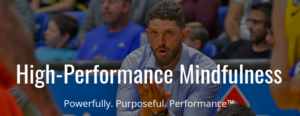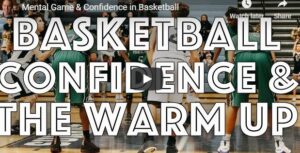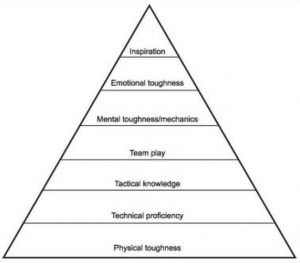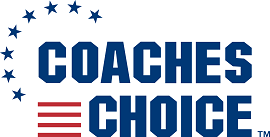High-Performance Mindfulness: How to better translate in-practice repetition for in-game statistical improvement
By Jake Rauchbach – founder of MindRight Pro® Coaching Program
Top 5 ways for players translating in-practice repetition into in-game statistical performance improvement
There are players at all levels of basketball, including the NBA, that struggle to connect the dots on how to translate their practice repetitions into actual statistical performance improvement
during the game.
In past columns, we have discussed how unconscious performance blocks can derail a player’s improvement. A refresher for some of the most commonly held subconscious barriers to performance can be found here and here.
Unconscious barriers to success can affect a player’s ability to consistently perform at optimum levels. This being said, we have all seen players that seem to be able to seamlessly migrate practice repetition over to in-game performance improvement, while other equivalently talented
players seemingly struggle to do so.
So, what is the underlying reasons for this dichotomy in player development? What’s the differentiating factor for translating practice repetition into in-game performance improvement?
The answer is mental focus.
Mental Focus is Key.
[adinserter name=”Basketball in article display ad 2 rebecca”]
The consistency with which a player remains mentally locked-in is crucial. A player’s ability to interface with his present moment awareness during their timeline for preparation (practice, individuals’ workouts, film study, and the game) directly influences how much translatable on-court performance improvement will be had by the player come game-time.
One of the main things that coaches tell players is: Come ready to play! Interpreted more literally, this means Come Focused. However, many players do not have a repeatable process for getting the most out of their preparation process.
There Are Levels to This
It is important to note that there are levels of application for High-Performance Mindfulness techniques. Just like progressions in an on-court skill-development series, a similar process is employed when teaching players how to sharpen focus to statistically improve performance.
There are foundational tools and skill-sets that players can pick up and begin to employ straightaway.
There are also leading-edge Energy Psychology – Integrated Player Development processes, specific to each player, that zero in on statistically improving specific parts of a player’s game that the player, coach, or General Manager pre-determines. This is the next level of HighPerformance Mindfulness. We will break these down at a later date.
For this column, we outline some foundational HPM tools that players can begin to employ immediately to begin to sharpen focus and influence in-game improvement upwards.
Foundational Techniques for Improving Mental Focus
Meditation
Meditation has been scientifically shown to help improve focus and attention, creative thinking, and regulation of emotions; all of which are critical elements for successfully processing through split-second reads during the game. Meditation has also been shown to decrease depression and anxiety.
There are many types of meditation practices. However, what I have seen to work best for highlevel basketball players is through employing a 15-minute meditation sessions twice a day, once in the morning, and once at night. Twenty years ago there were very few athletes who would touch a Yoga practice.
Look for Meditation to become the new Yoga, helping athletes sharpen focus and master internal peace of mind. The effects of this technique, when fed into an overall focus for on-court performance, is immense.
Affirmations
Affirmations are an unbelievable way for players to clear and reprogram their deep subconscious minds of the toxic performance blockages stemming from experience. I have found “I AM” statements to be most powerful when working with players who employ these techniques on the
court during the game.
The reason for this is that it reaffirms a new mental program, while simultaneously counteracting emotional baggage, which has the effect of sharpening mental focus. When mental focus improves, so too does overall performance.
Visualization
Visualization re-trains a player’s mind to expand the boundaries for what is deemed possible. One of the more profound experiences is observing players who manifest virtually the same play on the court that they have mentally rep’ed during visualization. We are talking about the over
the top plays that they haven’t been pulled off in months, maybe sometimes years.
Common examples of plays that high-major college and professional basketball players often visualize and then directly thereafter manifest on-court are:
1. The Pick-Six: Denying the passing lane – Creating a Stealing – Going for an uncontested finish on the other end. This play is common for players who begin to focus on improving ballpressure through visualization techniques.
2. The Big-Time Block: Rotating over to pin the ball against the glass – above the square versus an unsuspecting offender. This is a big-time energy play that happens frequently when
leveraging visualization to optimize defensive efficiency.
3. The Dunk-On: Dunking on or over someone maybe one the most energizing plays in basketball. When visualization is employed to rep this specific play, often the player capable of such finishes performs it in real-time on the court.
Generally, this is an eye-opening experience for the player. There is a level of connection made by the player between the mental rep and the on-court execution of said play that helps to reinforce the High-Performance Mindfulness training.
These types of plays give the player a discernible cause and effect experience. From implementing the mental rep, to manifesting the specific play on the court. Experiences like these help players connect the dots on how mental training positively correlates to improvement
on the court.
Breath-Work
The implementation of Breath-work deepens awareness and has been employed by different cultures around the globe for years. Foundational breathing techniques are also the building blocks for many of Martial Arts such as Qigong, Tai Chi, and Karate.
These types of techniques have been shown to help players hone focus by becoming more present, getting the athlete out of their head and into their present moment of awareness.
Improving focus this way can have the overall effect of helping to move the dial when it comesto on-court performance improvement.
Practicing Detached Observation
Observation is a key component in every technique mentioned herein. It is important to mention that it as a standalone technique.
Once players are better able to recognize that they are not their thoughts, they are generally able to make the shift in detaching from the performance blocking thoughts and emotions that have historically been holding them back.
This creates peace of mind and facilitates greater present moment poise and focus.
In Closing
Improving in-game performance comes down to consistent mental focus over the preparation timeline. Employing foundational techniques mentioned above will begin the process, helping players prioritize focus as a way to optimize performance efficiencies during the game.
If you would like to learn more from Jake check out his course:
Mindfulness for Basketball Coaches 101™
Learn High-Performance Mindfulness tools that can take your team to the next level!
What you’ll get:
- Virtual Coaching by Elite Mental Skills Coach to the Pro’s, Jake Rauchbach
- Pre-Game Visualization #1
- Pre-Game Visualization #2












